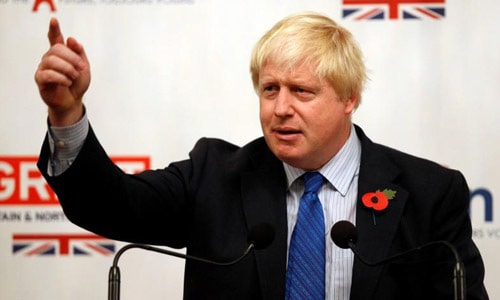Former Foreign Secretary Boris Johnson becomes new British Prime Minister
Boris Johnson will take over from Theresa May as prime minister tomorrow and is expected to reshuffle his cabinet in the coming days.
 |
| New British Prime Minister Boris Johnson. Photo:Reuters. |
Former British Foreign Secretary Boris Johnson was elected today as the new leader of the ruling Conservative Party, meaning he will become the new British Prime Minister. He will take over from Theresa May from July 24.
About 160,000 Conservative Party members voted over two and a half weeks to choose a new leader. Johnson won 66.4% of the votes while his rival Jeremy Hunt received 33.6%.
Boris Johnson, 55, is a famous politician and former Mayor of London. In 2016, he was appointed Foreign Secretary by Mrs. May, then resigned in July 2018.
Johnson's victory is not considered surprising, as he has received a lot of support since Mrs. May announced her resignation after failing to bring about a Brexit deal with the European Union (EU).
Johnson is expected to make a series of cabinet changes in the coming days as he prepares for Brexit deal talks.
Immediately after Johnson's victory, EU leaders congratulated the new British Prime Minister and said they wanted to work with him to pass Brexit.
"We look forward to working intensively with Prime Minister Boris Johnson when he takes office, to facilitate ratification of the withdrawal agreement and achieve an orderly Brexit," EU negotiator Michel Barnier wrote on Twitter.
US President Donald Trump also congratulated Mr. Johnson on becoming the new British Prime Minister. "He will be great!", Trump wrote on his personal page and declared himself a "big" fan of Johnson.
Last week, the US president expressed confidence that Johnson would fix what he called the "disaster" caused by Mrs May's attempt to take Britain out of the EU.
Johnson took over from Mrs. May amid a Brexit deadlock, while the UK's scheduled departure from the EU is October 31.
Before becoming the new prime minister, the former foreign secretary faced fierce opposition from many key members of the cabinet due to his hardline stance on Brexit.
Johnson has said he is willing to leave the EU without a deal, rather than delay the process again.
By law, the leader of the Conservative Party will remain prime minister as long as the party has a majority in parliament. General elections in the UK are held every five years, the most recent being in 2017.
The Prime Minister has the power to call an early election if 66% of MPs support it. However, Johnson has said he will not call a general election before the Brexit deadline of 31 October.

